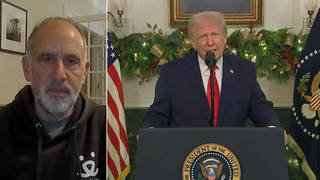
Guests
- Naureen Shahdirector of Amnesty International USA’s Security and Human Rights Program.
The Obama administration has moved to formally end the national registry program for immigrants from majority-Muslim countries, known as the National Security Entry-Exit Registration System, or NSEERS. Obama’s move comes only one day after Donald Trump appeared to reiterate his pledge to reinstate this very registry, when answering a question from a reporter outside his Mar-a-Lago resort in Florida Wednesday. The reporter was asking Trump about Monday’s attack on a Christmas market in Berlin, Germany, which left 12 people dead. In response, Trump said, “You’ve known my plans all along, and it’s––they’ve proven to be right, 100 percent correct.” We speak to Naureen Shah, director of Amnesty International USA’s Security and Human Rights Program.
Transcript
JUAN GONZÁLEZ: The Obama administration has moved to formally end the national registry program for immigrants from majority-Muslim countries, known as the National Security Entry-Exit Registration System, or NSEERS. Obama’s move comes only one day after Donald Trump appeared to reiterate his pledge to reinstate this very registry, when answering a question from a reporter outside his Mar-a-Lago resort in Florida Wednesday. The reporter was asking Trump about Monday’s attack on a Christmas market in Berlin, Germany, which left 12 people dead. In response, Trump said, quote, “You’ve known my plans all along, and it’s—they’ve proven to be right, 100 percent correct,” unquote. Trump first spoke about creating a registry while campaigning for president.
REPORTER: Should there be a database system that tracks the Muslims here in this country?
DONALD TRUMP: There should be a lot of systems, beyond databases. I mean, we should have a lot of systems. And today you can do it. But right now, we have to have a border. We have to have strength. We have to have a wall. And we cannot let what’s happening to this country happen any longer.
REPORTER: But that’s something your White House would like to implement?
DONALD TRUMP: Oh, I would certainly implement that.
JUAN GONZÁLEZ: Over 200 organizations, as well as Democratic lawmakers, mayors and businesses, have been calling on the White House to take action to end the registry before Trump takes office. Well, on Thursday, the Department of Homeland Security submitted a rule change in efforts to dismantle the legal framework for the registry, apparently in order to prevent Trump from reviving it. In a statement, a spokesperson for the Department of Homeland Security called the program, quote, “redundant, inefficient and provided no increase in security,” unquote.
AMY GOODMAN: The registry was created after the September 11th attacks. Under the program, more than 10,000 Muslims were deported, tens of thousands were spied on. The Department of Homeland Security abandoned the program 10 years later, in 2011, after massive pressure from civil liberties groups.
One of the main architects of the program was Kansas Secretary of State Kris Kobach, who was then working inside George W. Bush’s Justice Department. He’s now a member of Donald Trump’s transition team. In November, he accidentally revealed his proposed strategic plan for the Department of Homeland Security, which includes reinstating the registry and imposing an ideological, quote, “extreme vetting,” unquote, test for immigrants seeking to enter the United States. Kobach revealed these plans when he was photographed carrying documents outlining this strategic plan into a meeting with Donald Trump.
Well, for more, we’re joined by Naureen Shah, director of Amnesty International USA’s Security and Human Rights Program.
Naureen, start off by talking about what President Obama is dismantling.
NAUREEN SHAH: Well, President Obama is dismantling a program that had really been a paradigmatic example of racial and religious profiling in this country. And the fact that he’s dismantling it is a huge vindication for human rights. It’s a vindication for Muslims, South Asian and Middle Eastern groups that have been working towards this moment for quite a long time. But it’s also important to recognize that this was a program that was controversial from the start under the Bush administration. People had been looking to scrap it within DHS since 2006, and it had been abandoned, as you know, by the Obama administration. It was obsolete. It was not a value add to national security at all. But what it had achieved was fearmongering, scaring people in these communities, driving families apart, deportations. It was ineffective and counterproductive.
JUAN GONZÁLEZ: But what would dismantling it effectively mean at this point, since it really hasn’t been used now for several years?
NAUREEN SHAH: What dismantling it means is that for the Trump administration to come in, it’s going to be that much harder for them to start a new Muslim registry program. So what we have, basically, is that the edifice or the foundation for a Muslim registry has been taken out of the agency’s rules, and in order to bring it back in, the Trump administration is going to have to start a whole new process—that doesn’t mean that they can’t do it—and that even if they do try to do it, it will be challenged on constitutional grounds. We are far more ready for this fight than we were back in 2002, when this all started with the Bush administration. But what the Obama administration has done is dismantle the infrastructure. They’ve also sent a really important signal that racial and religious profiling, that’s not the norm. That’s not something we just accept as a country.
AMY GOODMAN: The Electronic [Privacy Information] Center, EPIC, has reported that a company co-founded by billionaire Trump adviser Peter Thiel provided secret assistance to the U.S. Customs and Border Protection as it tracked travelers and immigrants. The tools built by Thiel’s data mining firm Palantir could help Trump limit migration to the U.S. and to create a Muslim registry. Thiel’s company already has contracts with Immigration and Customs Enforcement, the Departments of Justice and Defense, and the CIA. Thiel drew fire earlier this month when he refused to confirm whether he’d signed an ethics agreement to recuse himself from any matter affecting his self-interest. He was shown sitting next to Trump when he met with all the heads of, you know, Google and Facebook etc. Now, Naureen Shah, what about this?
NAUREEN SHAH: Well, we’ve been calling on Palantir and several other technology companies to make very clear that they will not participate in the construction of a registry of American Muslims. Many of them have said that they wouldn’t, but that’s just at a surface level. What we know is that over the last 15 years hundreds of companies have participated in information gathering and information mining about U.S. citizens and noncitizens in this country, people, millions of people, all over the world. And this is the big problem. President Obama is dismantling the NSEERS program through that DHS rule yesterday, but, at the same time, they basically are handing over a dictator’s dream of surveillance technology, information about people in this country and around the world, that can be used to stifle dissent in this country, to make it so that people who are going out to protest have to be worried about the kinds of retaliation and targeting that they could face. We are in a very dangerous point in terms of the technology that’s about to be handed to the Trump administration.
JUAN GONZÁLEZ: And, Naureen, I’d like to ask you about another topic. You authored a report for the Columbia Law School called—on drones, titled, quote, “The Civilian Impact of Drone Strikes.” And you’ve raised that you believe that the drone program will be one of the Obama administration’s worst legacies. Can you talk about that?
NAUREEN SHAH: Well, what we have with drone strikes is a very dangerous legacy of the president acting as judge, jury and executioner for—through a drone program. And what we have been calling on President Obama to do, at Amnesty International, for the last several years, is at least end some of the secrecy surrounding the program, what the rules are that the Obama administration considers itself to be following when it’s conducting drone strikes. We know drone strikes have killed thousands of people in Yemen, Pakistan. There are also U.S. airstrikes in Somalia. There’s a level of secrecy about who is being killed in these strikes. What the Obama administration has done over the last year is disclose a lot more information about who is being—who is running the drone program, what the rules are that they’re following. What we still don’t know from the Obama administration is more detail about who is being killed. So, a woman killed in her family’s field in Pakistan in 2012, that Amnesty International documented, the Obama administration has never come clean about that killing. They’ve never apologized. They’ve never acknowledged it. In fact, we don’t know the names of any acknowledged civilian victims of drone strikes in Pakistan, because the Obama administration just hasn’t come forward with that. That leaves a very dangerous legacy for the next administration, that can also come in and kill in secret and just say, “Well, the people who start—who were ramping up this program to begin with, they didn’t acknowledge the killings either.”













Media Options